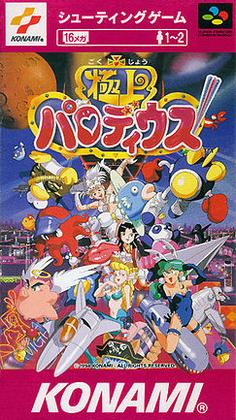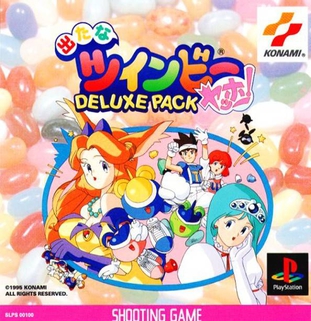
Hudson Soft Co., Ltd. was a Japanese video game company that released numerous games for video game consoles, home computers and mobile phones, mainly from the 1980s to the 2000s. It was headquartered in the Midtown Tower in Tokyo, with an additional office in the Hudson Building in Sapporo. Hudson Soft's mascot is a bee named Hachisuke.
TwinBee (ツインビー) is a video game series composed primarily of cartoon-themed vertical-scrolling shoot-'em-up games produced by Konami that were released primarily in Japan. The series originated as a coin-operated video game simply titled TwinBee in 1985, which was followed by several home versions and sequels. The character designs of almost every game in the series since Detana!! TwinBee in 1991 were provided by Japanese animator Shuzilow HA, who also planned and supervised most of the subsequent installments in the TwinBee series. The series also inspired a radio drama adaptation that lasted three seasons in Japan, as well as an anime adaptation.
Bonk, known as PC-Genjin in Japan and as PC Kid or B.C. Kid in PAL territories, is a video game character and former mascot for NEC's PC Engine/TurboGrafx-16 video game console. Three platform games featuring the character appeared on the PC Engine/TurboGrafx-16, as well as two spin-offs featuring Air Zonk. The protagonist is a bald caveman named Bonk who attacks using his comically large head.

Jikkyō Oshaberi Parodius is the fourth game in the Parodius franchise, a series of parody shooters produced by Konami. The gameplay is stylistically very similar to the Gradius series, but the graphics and music are intentionally absurd. The game contains a large number of Japanese voice samples shouted out in a style similar to that of a game show host. Unlike the previous two titles, Jikkyō Oshaberi Parodius was not created as an arcade game. It was first released on the Super Famicom in 1995 and then ported and updated for the PlayStation and Sega Saturn in 1996.

Bio Miracle Bokutte Upa is a Konami video game that was first released for a Japan-exclusive market in 1988 for the Family Computer Disk System. It was later released as a cartridge in 1993 for the Family Computer itself.

Sexy Parodius is a 1996 horizontal-scrolling shooter arcade game developed by Konami. It is the fifth installment of the Parodius series. Like the rest of the series, it is a parody of the Gradius series and other Konami games. It also contains sexual level and enemy designs, as well as risqué innuendo. Many level bosses are women in various erotic costumes or various states of undress.
Gradius is a series of shooter video games, introduced in 1985, developed and published by Konami for a variety of portable, console and arcade platforms. In many games in the series, the player controls a ship known as the Vic Viper.

Parodius! From Myth to Laughter, released in Japan as Parodius Da! Shinwa kara Owarai e and outside Japan as Parodius, is a shoot 'em up arcade video game and the second title in the Parodius series produced by Konami. The European SNES, Sega Saturn and PlayStation versions are also known as Parodius: Non-Sense Fantasy. The gameplay is stylistically very similar to the Gradius series, but the graphics and music are intentionally absurd.

Parodius: The Octopus Saves the Earth, also known as Parodius, is a scrolling shooter video game developed by Konami for the MSX computer and was released in Japan. The game is notable for being the first title in the Parodius series, although it is often confused with its sequel Parodius! From Myth to Laughter. The name itself is a portmanteau of "Gradius" and "Parody" and, eponymously, the game is a parody of the Gradius series of space-based horizontally scrolling shooters. Many of the characters and enemies are derived from that famous shooter series, while other elements are extracted from other Konami titles, such as Antarctic Adventure and TwinBee. This game is of particular note in the series as being heavily infused with Japanese culture and folklore.

Gokujō Parodius ~Kako no Eikō o Motomete~, translated as Gokujo Parodius – Pursuing the Past Glory and also known as Fantastic Journey, is a 1994 side-scrolling shooter arcade game developed and published by Konami. It is the third entry in their Parodius series, itself a parody spin-off of their Gradius series.

Konami Wai Wai World, "wai wai" being a Japanese onomatopoeia expressing a noisy or boisterous atmosphere, is a 1988 Family Computer platform video game released only in Japan by Konami. The game itself stars various Konami-created characters as well as Mikey and King Kong, who appeared in two Konami-produced, film-based games.

Wai Wai World 2: SOS!! Parsley Jō is a 1991 Famicom platform game released only in Japan by Konami. It is a sequel to Konami Wai Wai World, and stars various Konami characters. It was also re-released for the Wii U Virtual Console on September 2, 2015 in Japan.

Paro Wars is a turn-based strategy video game produced by Konami in September 1997 in Japan only. It features characters and conflicts based upon the popular Parodius series of video games which in turn is a parody of the long running Gradius series. It is the last installment of the Parodius series and is the Parodius equivalent to Cosmic Wars, a turn-based strategy game set in the Gradius universe, or R-Type Tactics, set in the R-Type universe.

Cosmic Wars is a turn-based strategy video game produced by Konami in 1989 which is based upon the characters and conflicts of the popular Gradius series. It was released only in Japan. The game received a sequel in 1997, with Paro Wars, which is the Parodius equivalent of this game.
Star Soldier is a series of scrolling shooters mainly developed by Hudson Soft. Konami has owned the rights to the series since their absorption of Hudson Soft in 2012.
Konami GB Collection is a series of video game compilations composed of four volumes released in Japan for the Game Boy and re-released in Euro regions for the Game Boy Color. The compilations were originally released from 1997 to 1998 in Japan, and were later released in Europe in 2000.

Star Parodier is a vertical-scrolling shoot 'em up video game developed by Kaneko and published by Hudson Soft for the PC Engine CD-ROM² in 1992. It is a spin-off of the Star Soldier series and was localized for North America as Fantasy Star Soldier, but this version was never released. The game was released for the Wii Virtual Console on March 7, 2008 in Japan, March 16 in Europe and later in North America on August 11. The title is also playable on the Turbografx-16/PC Engine Mini Console.

Star Soldier is a shoot 'em up video game developed and published by Hudson Soft for the Nintendo Entertainment System and the MSX. It is the first game in the Star Soldier series. The player pilots the starship "Caesar", traveling through space stations occupied by powerful supercomputers known as "Starbrains" who threaten the galactic empire. Star Soldier greatly resembles the earlier arcade game Star Force.

Detana TwinBee Yahho! Deluxe Pack is a 1995 two-in-one video game compilation developed and published by Konami for the PlayStation and Sega Saturn. It is the second Deluxe Pack release following Gokujō Parodius Da! Deluxe Pack, which included both Parodius Da! (1990) and Gokujo Parodius (1994). Part of the TwinBee series, it includes the original arcade versions of both Detana!! TwinBee and TwinBee Yahho!. In both games, players assume the role of Light and Pastel taking control of TwinBee and WinBee to defeat invading forces of the evil alien Iva and Archduke Nonsense to save planet Meru and the Land of Wonders island after receiving an SOS message sent by princess Melora and Queen Melody.














